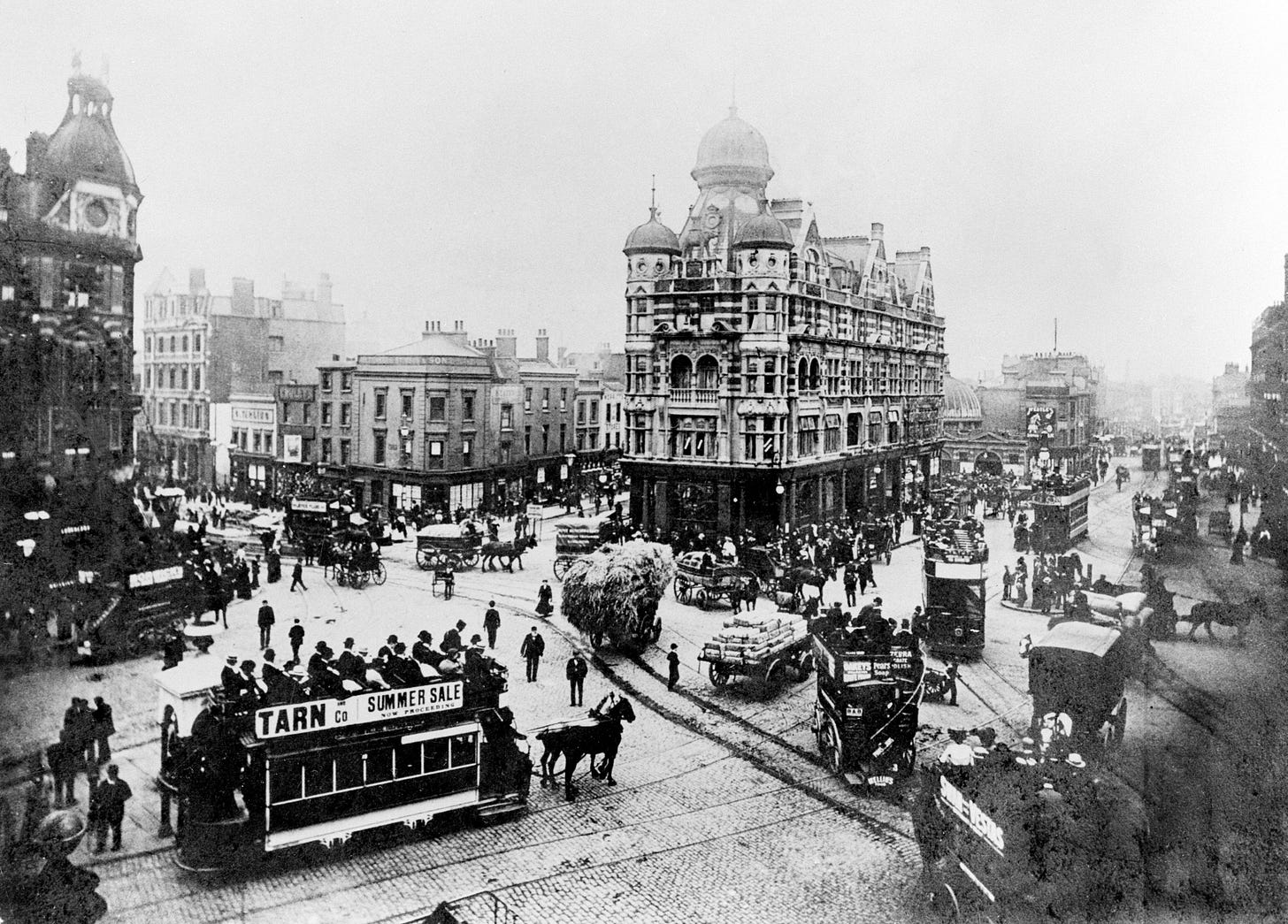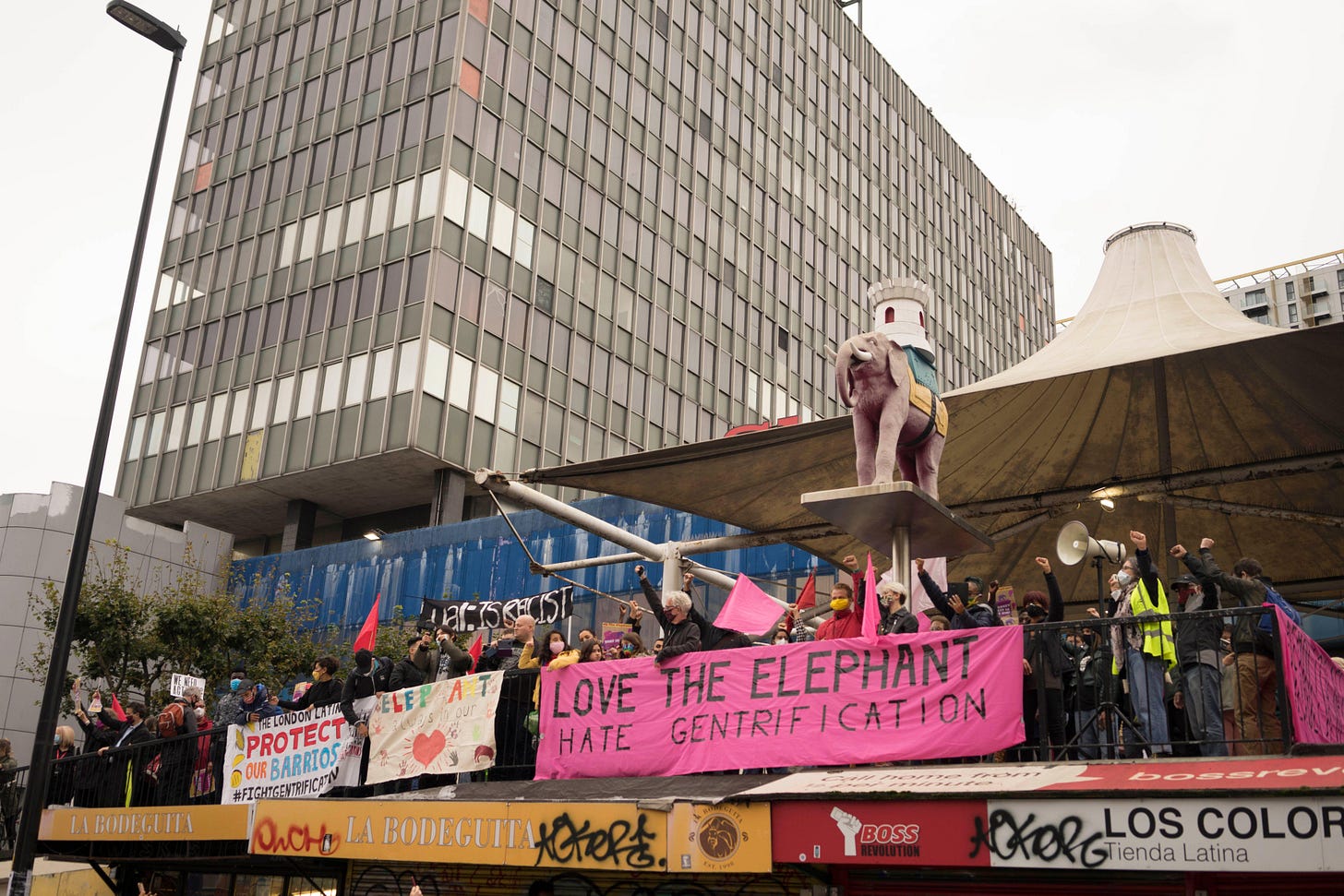Did the evicted Elephant and Castle restaurants stand a chance?
Plus: Another investigation into the struggling cinema operator, plus a £12m house in a former working men's club in west London.
One topic has really dominated the London Centric inbox this week: The eviction of a group of Caribbean, South American, and African restaurants in south London’s Elephant and Castle by developers in a dispute over unpaid bills.
The loss of these businesses hit a nerve, because ensuring these restaurants remained on the site was one of the concessions won from the landlords who are rebuilding the entire area in a £4bn regeneration masterplan.
It’s a story that’s relevant to redevelopment sites across London: can small local businesses ever outlive the transformation of the landscape around them — or do attempts to find a new home inevitably end in failure?
Scroll down to read the full story, details of the dispute that caused their eviction, and pictures of the area’s previous rebuilds.
Labouring towards a new mayoral candidate
Our list of who’s in the running to succeed Sadiq Khan as Labour’s mayoral candidate led to some intriguing texts, especially over who could run on the right-wing of the Labour party. The main conclusion? The phoney war between candidates is very much underway but — unless you’re Dawn Butler — most of the candidates feel it would be a bit presumptuous and disloyal to go public at this stage. Which is great news for local news outlets who will be bringing you the twists and turns of this shadow race.
Really Local Group deliver a new explanation
After last week’s report on Preston Benson, the man behind Really Local Group’s struggling chain of London cinemas and venues, the London Centric inbox filled up with messages from former employees who felt they were promised the world and nothing materialised. We also heard from a second PR agency who were employed by Benson but failed to be paid for most of their work.
Benson got in touch after publication to ask for an extra comment, which you can read in full on the piece. He said he takes “full responsibility for the Really Local Group’s difficulties” but that the “Southwark council’s interference at Peckham Levels and Santander’s accidental account closures” made it difficult to manage his business’ cashflow. He also blamed “repeated council interventions that led to our current malaise”.
He insisted that he’s succeeded in keeping the Sutton cinema open while repaying £400,000 to creditors, including employees and film distributors. He also wanted to emphasise that, aside from a BFI bailout, his Catford and Ealing sites were privately funded.
A few days after our story went out, the Bureau of Investigative Journalism and the BBC published, entirely coincidentally, a separate investigation into how Benson treated a former bar manager. A tribunal ruled she was unfairly sacked from south London’s Peckham Levels after raising concerns about fellow staff being on drugs. Even though the woman won her employment tribunal, she never received a penny of her awarded £65,000 because that particular subsidiary of Benson’s venue empire was placed into administration.
Preposterous property of the week
Who wants to live in a former working men’s club in Kensal Rise, west London, for £12m? While other such institutions are still (just about) in existence and using their old Victorian buildings, this one has already had a second life as a private restaurant and club before being turned into a six bedroom private residence. Admire the roof terrace overlooking the Grand Union Canal, ponder the existing owner’s artwork choices, or simply try to work out what the deal is with that suspended seat in the middle of the living room.
Want to get in touch with London Centric? Send an email or a WhatsApp.
This week’s eviction of four restaurants in Elephant and Castle triggered protests and an online row – but what’s actually going on?
By Cormac Kehoe
When south London’s Elephant and Castle shopping centre closed down in 2020 to make way for hundreds of new homes, offices and restaurants, it was with a promise that part of its community would eventually return to the site.
The ageing shopping centre, in its time the first US-style covered mall in Europe, was more than just another well-connected redevelopment site. It contained a thriving and diverse community of traders, many from London’s Latin American, Caribbean and African communities, who had for decades taken advantage of the area’s cheap rents and surplus units to open restaurants serving the local community.
Aware of negative press coverage around gentrification, the local Southwark council required the developers of the massive £4bn regeneration project to ensure many of the shopping mall’s existing restaurants and retailers could continue to operate. The developer’s solution was Castle Square, a slightly sterile container-style temporary food court and shopping area on the other side of the Thameslink railway tracks, which features the shopping centre’s old statue of an elephant.

This is, in the developer’s words, a “temporary and affordable retail and restaurant space” designed to ensure Elephant and Castle “remains a vital and enlivened shopping destination whilst the new town centre is being developed”. Restaurants and retailers from the shopping centre were given five-year leases in the block, then told that they’d be given priority to move back into units in the new “town centre” when the redevelopment finished in 2026.
Yet some didn’t last the course. This week four remaining restaurants in Castle Square – serving Guyanese, Jamaican, Nigerian and Ecuadorian cuisine – came to the end of the road. For their owners, their dream died when they turned up on Wednesday to find their premises seized in a dispute over a backdated electricity bill. Decades of trading in the area came to a halt, ending their hopes of returning to their old territory.
The incident has blown up on London’s food Instagram pages this week. But what really happened? And was it ever realistic to expect a group of small London restaurants to survive the complete reconstruction of the area they used to serve?
“We feel that the way they pursue things to get the rich people in and the poor out.”
Faye Gomes had been running her Guyanese food business Kaieteur Kitchen in the Elephant and Castle shopping centre for more than a decade when the time came to relocate.
As she noted in a 2021 interview with OnLondon, life running a restaurant in a decaying leisure complex wasn’t easy. The site delivered footfall and passing trade — but also a stressful life dealing with break-ins and people threatening to vandalise her premises unless she gave them food. At first, the purpose-built units at Castle Square gave her security and hope, she said: “I am confident that everything is going to come back nicely. For me, everything is going to get better.”
Four years later that feels like a distant memory. This week Gomes turned up at Castle Square to find a note saying her premises had been repossessed in a row over an enormous backdated electricity bill. Similar notes were on the doors of Original Caribbean Spice, Daddy O’s, and El Guambra. When she tried to put her key in the door she realised the landlord had changed the lock.
When the restaurateurs originally moved into Castle Square on five-year leases they were given free electricity for the first twelve months, a big help during the Covid pandemic. This was part of a deal with their new landlords, the area’s developers, Get Living, who describe themselves as “one of the UK’s leading build-to-rent operators”.
That was as good as it got. Many of the restaurants complained of low footfall, arguing they were being commercially strangled by the new location which didn’t have anything like the same passing trade.
At the same time the restaurants say they heard nothing about electricity payments from Savills, the managing agent, until 2024.
Gomes told London Centric that she and the other tenants regularly asked for an updated bill: “Anytime there’s a meeting, we brought it up but got nothing. We kept asking them, ‘will we get it soon?’”.
She claims they were told: “It will be with you soon. There is some mistake in reading it.”
When it landed, the back bill for four years of electricity was for £12,000. Gomes told the managing agent she couldn’t afford that much but would pay them off as money came in through catering for functions and other business. Just before the eviction, she said, “I had just started paying them £500 a week”.
Four tenant businesses were evicted this week, while Coma y Beba, a Colombian cafe, closed in the summer after facing similar issues over back payments.
Savills declined to comment on why they’d waited so long to send the bills. A spokesperson for Get Living told us they “deeply regret that, despite eighteen months of intensive engagement” the restaurants “have not been able to clear their arrears or agree to reasonable payment plans”.
Other traders in Castle Square have managed to get 18-month lease extensions to keep them in business until spaces start opening up in the newly redeveloped area in mid 2026. However, for the four evicted traders, an extension or a move to the new town centre now seems unlikely.
Steven Landeta’s mother, Marlene Calderon, owns El Guambra, one of the affected businesses that was relocated from the food court of the old shopping centre to Castle Square. He described his mother as being “of the age that she likes doing what she does and cooking is what she loves”.
Landeta insisted his mother would have been able to pay the electricity bill if it had been charged monthly but the three years of backdating left them financially stricken. Still, they were hoping to be able to move back into the new development when the bill was dealt with. Instead, the bailiff notice coincided with being told they wouldn’t be allowed back into the new town centre units when it reopens: “They said that given the fact that we have arrears, our application was going to be refused. We feel that the way they pursue things is to get the rich people in and the poor out.”
“I invested almost £2,000 in groceries.”
What gives these evictions added potency is their context, taking place in the middle of one of London’s most high-profile regeneration projects. In the process it raises questions over whether it’s ever possible for existing traders to keep a foothold in an area of the capital that’s undergoing massive transformation.
In 2023, a Spectator article mused that, “while the rest of Zone 1 seemingly saw wall-to-wall gentrification, Elephant and Castle remained an outpost of stubborn, scruffy ordinariness, an oasis of discount stores, greasy spoons and traditional boozers.” But even they rued the fact that the area now “is a far more homogenised and middle-class affair.” Others have gone further, with one local councillor warning the redevelopment “risks being social cleansing and not social regeneration.”
Even before the shopping centre was shut down and demolished, traders were deeply mistrustful of developers and landlords. One of the South American business owners told a team of UCL academics who interviewed them in 2016 that the landlord had already increased rents by 50%: “[The shop owner] considered this a strategy by the real estate developer to keep the retailers occupied internally with the survival of their business, preventing them from realising the bigger picture and organising collectively to advocate for their interests within the regeneration process.”
This week the landlord said that “enforcement action is never our desired course of action” and that they had taken the measure “as a last resort after all reasonable alternatives were exhausted.”
Alejandra from Latin Elephant, a campaign group that has represented local residents and businesses throughout the redevelopment, told London Centric: “It’s misleading to claim all reasonable alternatives were exhausted. Reasonable engagement would have meant transparent billing (such as providing supplier bills) to enable clarity on the sums from the beginning, and a realistic payment plan. Traders have consistently asked for this, but never received it.”
In the meantime, Gomes faces an uncertain future and a lot of raw food that will soon start to go off: “Right now I’m in my house, doing nothing. I still have to find a way to pay my staff. On Monday, the butchers, the fishmonger, and the vegetable man came in. I invested almost £2,000 in groceries. Now it’s all in the freezer.”
“I stayed when it was ugly and now I want to stay when it’s pretty.”
Elephant and Castle, like many areas of London, has been reinvented many times over. In the 19th century it was a warren of shops and entertainment venues by a busy road junction that led to it being dubbed the “Piccadilly of the south”.

During World War Two it was badly bombed with most of the remaining Victorian buildings cleared to enable it to be reimagined as a bold vision of London built around the private motor car, designed to prioritise the flow of traffic and allow people to drive to the newly-built shopping centre.

It was the ultimate failure of that shopping vision that provided the space for restaurants such as Kaieteur Kitchen to move in. Now, as tastes change and the local economy revives, the same shopping centre has been demolished to prioritise a new base for the London College of Communication, a new Bakerloo line station, and thousands of new homes in comfortable high-rise apartment blocks. One of the architects attached to the latest redevelopment project describes it as an “opportunity to correct post-war urban challenges that have long afflicted one of south London’s busiest junctions”.
Any journey through the redeveloped Elephant and Castle these days shows it has still a busy restaurant scene, with independent cafes trading alongside chains like Gail’s and Nando’s. In the summer families flock to the new paddling areas in the middle of the redeveloped area. The area is not dead — it’s just often a different clientele.
One of the questions that’s impossible to answer is whether the old traders would have been able to afford to stay in the area if the shopping centre had remained — or whether the area would have naturally become more expensive as part of the capital’s endlessly rising property prices.
Back in 2016, when the UCL academics spoke to Elephant and Castle locals about the impending redevelopment, one of the business owners in the shopping centre summed up their attitude towards the redevelopment: “If the whole community moves, I will move too. But I want to be involved in improving the Latin Quarter… I stayed when it was ugly and now I want to stay when it’s pretty.”








I suspect savills were instructed to be as opaque as possible with the bills so they could force businesses out with unpaid bills.
This would have been a strategy devised between the landlord and savills. Local cllrs should be pushing to investigate this ok but tbh cllrs are useless
Anyone know of any groups protesting the way the restaurant owners have been treated?